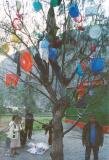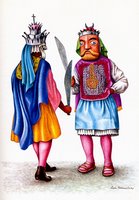
When at college, I visited Pampacocha, a small village in the highlands of Peru. The previous year, a group of students had been there during carnival and had felled a tree decorated with laces and small presents, planted in the middle of the town plaza (Yunza). Tradition dictated that those who felled the tree should put one up the next year.

Pampacocha was the place where our Social Sciences professor did ethnographic research on ancient celebrations such as "Moors and Christians", a ceremonial battle between villagers dressed as one or other side. In Spain, where this tradition originated, men prefer to dress as Moors because their costumes are more colorful and imaginative. In Pampacocha, during many years they had accumulated body armor, muskets, swords and many other props. The celebration brought people from all the province.
We arrived to Yaso, the part of the community near to the dirt road, on top of the battered bus- there was no room inside the bus. A man inside the bus looked at me with an angry expression. I had been indiscrete enough to sew a red star in front of my baseball cap, just as a juvenile prank, since our trip had nothing political. My Social Sciences professor -as others will do later- had warned me not to take my leftist beliefs too seriously: "you are inserting yourself in a prestigious career, through the leading Peruvian university, so don't pretend belonging to the proletariat".
That man in the bus-we later found out he was the local representative of the central government- thought we were guerrillas. Soon after we learned that that sub-prefect was planning to send police after us. A quick vote showed the student group was divided about what to do, and some left immediately. Perhaps they had seen the Mexican movie "Canoe" based on a real story: a group of students were wrongly regarded as guerrillas and killed in a village of the same name. Those of us who stayed brought vaccine from the nearby health post (1-day walk) vaccinated the kids, and prepared for the Yunza.
The family that provided us accomodation in their modest, no bathroom home, set up a rodeo to brand their cattle. Rodeo (roundup) started with an offering of cane liquor to the Apus, spirits in the mountains. Then we drank some of that liquor, and smoked cigarettes. Then we chased the calves. I lassoed five of them. Therefore I was awarded the privilege of carrying the lassos back to the household. I have since received several awards, but never as proud as in Pampacocha.
Yunza itself was a little dissapointing. Carnival was a lesser celebration in Pampacocha, with the Yunza as the focus. Couples danced around the decorated tree, hitting the trunk with an ax. Often, during Carnival in the highlands of Peru social rules become lax, and usually modest girls will chase men, and sometimes will have their sexual debut. But none attempted to do so with me.
After three weeks in Pampacocha I departed, loaded with wild flowers and local soft cheese. Ashamed of returning home so dirty, I took a shower in melted snow running downhill.
No comments:
Post a Comment